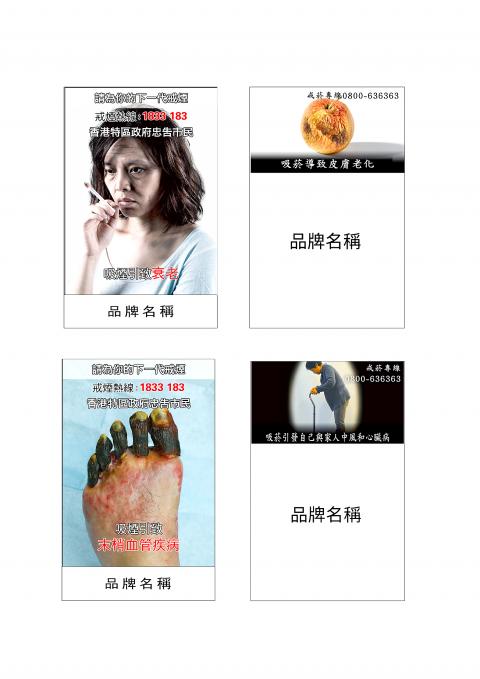Warning labels on cigarette packaging are too small and not “frightening” enough to be effective, academics said at a forum in Taipei on Monday.
The difference in the number of people who smoke in Taiwan (3 million) compared with Hong Kong (640,000) might be due to the difference in the sizes of warning labels on packaging, they said at the Tobacco Hazard and Prevention Forum for Cross-strait Locations, Hong Kong and Macau.
Warning labels in Taiwan only comprise 35 percent of packaging and are “a light reminder,” academics said.

Photo courtesy of the John Tung Foundation
The Hong Kong government stipulates that warning labels and pictures take up 85 percent of the packaging, with pictures of long-time smokers and the effects of smoking on the body, as well as warning labels, such as: “Smoking causes strokes” or “Smoking kills.”
Surveys have shown that the majority of Hong Kongers support the legislation, University of Hong Kong professor Lam Tai-hing (林大慶) said.
The pictures are thought to scare many young people off smoking, Lam said.
In Taiwan, government statistics last year showed that 15.3 percent of adults smoke, while young people who use e-cigarettes have doubled since 2015.
E-cigarettes were used by 3.7 percent of junior-high school students, compared with 2 percent in 2015, while their use among senior-high school students was 4.8 percent, compared with 2.1 percent in 2015, the statistics showed.
The Health Promotion Administration said it was aware of the statistics and amendments to the Tobacco Hazards Prevention Act (菸害防制法) have been sent to the Executive Yuan.
The amendments would increase the size of warning labels on cigarette packaging to 85 percent and would hike fines for illegal distribution of e-cigarettes in a bid to deter sales and distribution, the agency said.
Fines for illegal manufacturing or importing of e-cigarettes would be increased from NT$10,000 to NT$50,000 to NT$50,000 to NT$250,000, it said.
Illegal sales would be fined NT$10,000 to NT$50,000, up from NT$1,000 to NT$3,000, it said.
The Ministry of Health and Welfare said it would convene a panel to discuss the kinds of pictures that would be a deterrent to smoking.

Nvidia Corp yesterday unveiled its new high-speed interconnect technology, NVLink Fusion, with Taiwanese application-specific IC (ASIC) designers Alchip Technologies Ltd (世芯) and MediaTek Inc (聯發科) among the first to adopt the technology to help build semi-custom artificial intelligence (AI) infrastructure for hyperscalers. Nvidia has opened its technology to outside users, as hyperscalers and cloud service providers are building their own cost-effective AI chips, or accelerators, used in AI servers by leveraging ASIC firms’ designing capabilities to reduce their dependence on Nvidia. Previously, NVLink technology was only available for Nvidia’s own AI platform. “NVLink Fusion opens Nvidia’s AI platform and rich ecosystem for

WARNING: From Jan. 1 last year to the end of last month, 89 Taiwanese have gone missing or been detained in China, the MAC said, urging people to carefully consider travel to China Lax enforcement had made virtually moot regulations banning civil servants from making unauthorized visits to China, the Control Yuan said yesterday. Several agencies allowed personnel to travel to China after they submitted explanations for the trip written using artificial intelligence or provided no reason at all, the Control Yuan said in a statement, following an investigation headed by Control Yuan member Lin Wen-cheng (林文程). The probe identified 318 civil servants who traveled to China without permission in the past 10 years, but the true number could be close to 1,000, the Control Yuan said. The public employees investigated were not engaged in national

CAUSE AND EFFECT: China’s policies prompted the US to increase its presence in the Indo-Pacific, and Beijing should consider if this outcome is in its best interests, Lai said China has been escalating its military and political pressure on Taiwan for many years, but should reflect on this strategy and think about what is really in its best interest, President William Lai (賴清德) said. Lai made the remark in a YouTube interview with Mindi World News that was broadcast on Saturday, ahead of the first anniversary of his presidential inauguration tomorrow. The US has clearly stated that China is its biggest challenge and threat, with US President Donald Trump and US Secretary of Defense Pete Hegseth repeatedly saying that the US should increase its forces in the Indo-Pacific region

ALL TOGETHER: Only by including Taiwan can the WHA fully exemplify its commitment to ‘One World for Health,’ the representative offices of eight nations in Taiwan said The representative offices in Taiwan of eight nations yesterday issued a joint statement reiterating their support for Taiwan’s meaningful engagement with the WHO and for Taipei’s participation as an observer at the World Health Assembly (WHA). The joint statement came as Taiwan has not received an invitation to this year’s WHA, which started yesterday and runs until Tuesday next week. This year’s meeting of the decisionmaking body of the WHO in Geneva, Switzerland, would be the ninth consecutive year Taiwan has been excluded. The eight offices, which reaffirmed their support for Taiwan, are the British Office Taipei, the Australian Office Taipei, the